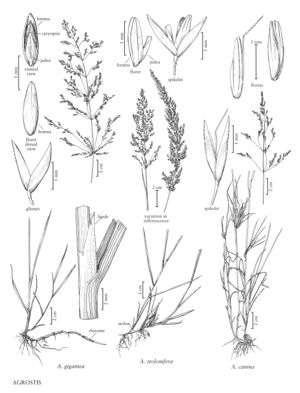Agrostis canina
Plants perennial; appearing loosely cespitose and forming a rather closed turf, stoloniferous, stolons to 25 cm, slender, leafy, weakly rooting and eventually producing tufts of shoots at the nodes, without rhizomes. Culms 15-75 cm, erect, frequently geniculate at the base, sometimes weakly rooting at the lower nodes, with 2-4 (6) nodes. Leaves basal and cauline; sheaths usually smooth, sometimes scabrous distally; ligules 1-4 mm, dorsal surfaces scabridulous, apices truncate to obtuse or acute, erose-lacerate; blades 1-10 cm long, 1-3 mm wide, usually flat, sometimes involute, usually scabrous, apices acute. Panicles 3-10 cm long, 1-7 cm wide, open, often lax, lanceolate to broadly ovate, lowest node with 3-7 branches; branches more or less scabrous, erect to spreading, usually branched above midlength, spikelet-bearing in the distal 1/3, patent at anthesis, lower branches 3-5 cm; pedicels (0.4) 1-3 mm. Spikelets lanceolate or narrowly oblong, brownish yellow to purplish or rarely greenish. Glumes subequal, 1.7-3 mm, 1-veined, scabrous only on the distal part of the midveins, acute; callus hairs to 0.1 mm; lemmas 1-2 mm, about 2/3 the length of the glumes, bases minutely pubescent, otherwise glabrous, translucent to opaque, 5-veined, veins prominent or obscure, apices acute to obtuse, entire, usually awned from near the base, awns to 5 mm, geniculate, rarely unawned, awned and unawned lemmas sometimes mixed within the panicle; paleas absent, or to about 0.2 mm and thin; anthers 3, 1-1.5 mm, at least 1/2 as long as the lemmas. Caryopses 0.8-1.2 mm; endosperm solid. 2n = 14.
Distribution
Maine, Conn., Mass., N.H., N.Y., R.I., N.J., Del., Md., W.Va., Pa., Minn., Mich., Tenn., Pacific Islands (Hawaii), Vt., Oreg., Greenland, N.B., Nfld. and Labr., N.S., P.E.I., Que.
Discussion
Agrostis canina is a Eurasian species that is now established in both western and eastern North America, where it grows on roadsides and open ground in summer-cool climates. It is used for fine-textured lawns and golf greens. Similar to A. vinealis (see next), it may be differentiated from that species by its creeping, leafy stolons that form a dense carpet, and the finer, softer texture of its leaves. Unawned plants have been called A. canina var. mutica G. Sinclair.
Selected References
None.
Lower Taxa
"decumbent" is not a number.
